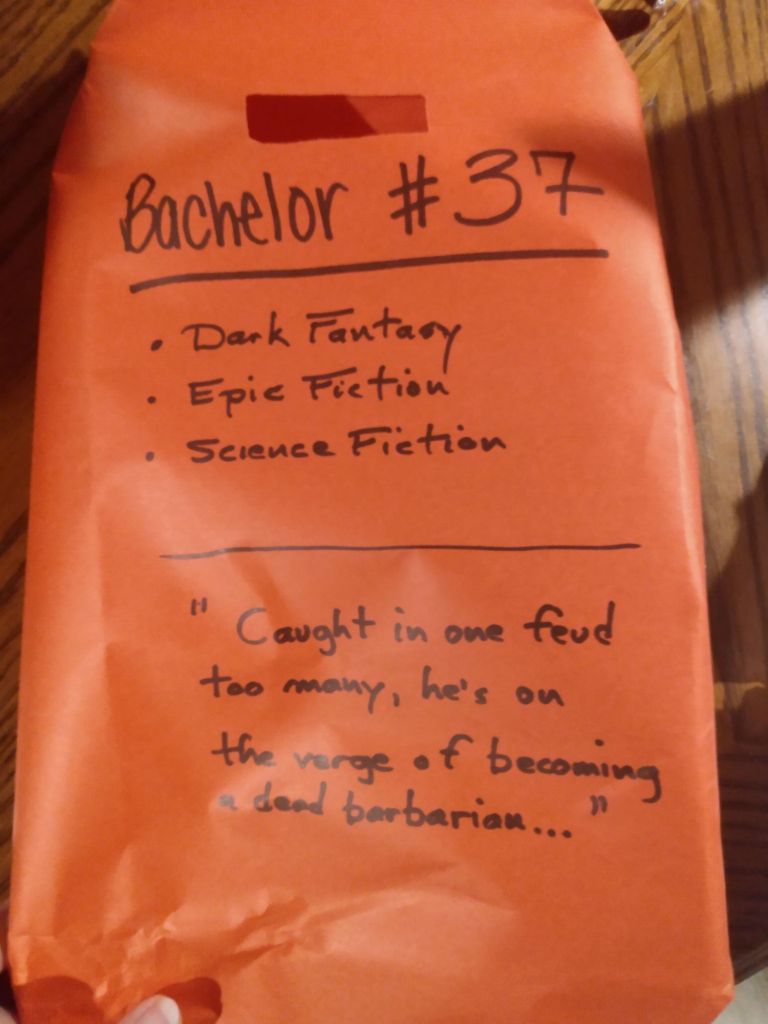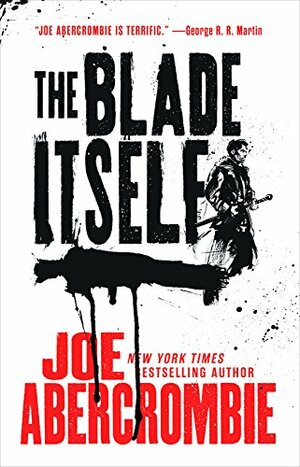Title: The Blade Itself
Series: The First Law Trilogy #1
Author: Joe Abercrombie
Genre: Fantasy
Trigger Warnings: Death (severe), blood (severe), violence (severe), gore (severe), injury (severe), animal death, child death, animal injury, murder, war, body horror (mild), slavery (mentions), excrement (mentions), ableism, sexism, physical abuse (one scene, plus mentions of it happening in the past), torture, cannibalism (mentions), rape (mentions), unreality, colonization (mentions), xenophobia (mentions), vomit, classism, fire/fire injury, alcohol use
Back Cover:
The first novel in the First Law Trilogy and debut fantasy novel from New York Times bestseller, Joe Abercrombie.
Logen Ninefingers, infamous barbarian, has finally run out of luck. Caught in one feud too many, he’s on the verge of becoming a dead barbarian — leaving nothing behind him but bad songs, dead friends, and a lot of happy enemies.
Nobleman, dashing officer, and paragon of selfishness, Captain Jezal dan Luthar has nothing more dangerous in mind than fleecing his friends at cards and dreaming of glory in the fencing circle. But war is brewing, and on the battlefields of the frozen North they fight by altogether bloodier rules.
Inquisitor Glokta, cripple turned torturer, would like nothing better than to see Jezal come home in a box. But then Glokta hates everyone: cutting treason out of the Union one confession at a time leaves little room for friendship. His latest trail of corpses may lead him right to the rotten heart of government, if he can stay alive long enough to follow it.
Enter the wizard, Bayaz. A bald old man with a terrible temper and a pathetic assistant, he could be the First of the Magi, he could be a spectacular fraud, but whatever he is, he’s about to make the lives of Logen, Jezal, and Glokta a whole lot more difficult.
Murderous conspiracies rise to the surface, old scores are ready to be settled, and the line between hero and villain is sharp enough to draw blood.
Unpredictable, compelling, wickedly funny, and packed with unforgettable characters, The Blade Itself is noir fantasy with a real cutting edge.
Review:
I didn’t pick this book up entirely by choice. For Valentine’s Day, my local library did a “blind date with a book” promotion where they wrapped the books up in paper and just put a few facts about them on the front. I love the concept (I appreciate anything that gets me to try new things), so I knew I had to try one. Eventually I picked this one, and here’s all I knew about it until I got home from the library and opened the wrapping:

This is where the blind date with a book concept really comes in handy, because I had actually looked at this book on the shelf previously and decided it didn’t look interesting. The back cover introduced way too many characters and not enough plot, and it seemed like it was going to be very unclear what was actually going on and maybe a little dull. But since I had been convinced to check it out, I figured I might as well read it.
First of all, Joe Abercrombie is clearly a very good writer. This book was extremely well-written, and despite how many things are going on, it’s balanced well, and though the place is slow, it never gets dull. I did not find myself eager and enthusiastic about reading this story as fast as possible, but I also never considered putting it down. It seems strange to call a book full of as much death, violence, and bloodshed a pleasant reading experience, but it was – not slow or dense enough to lose interest, not enthralling enough to get me truly invested in anything that happened or anyone involved, no protagonists I disliked but also none I really loved. (Actually, while they were perfectly fine to read about, every protagonist was a terrible person in their own way.) I had quite a good time reading but didn’t get emotionally involved. It was the violent fantasy version of casual reading.
But then I finished it. And my husband asked if I liked it. And I realized how difficult of a question that actually was to answer. Because, as previously mentioned, I did have a good time reading it. And there were lots of really interesting aspects. Glokta’s experience of existing in a disabled person in a world that’s built for able-bodied people was intense and quite well-done. Bayaz’s wizardly shenanigans were entertaining and I liked that the history of the magic system was part of the story. And though it was violent, the violence never felt excessive or overdone, except in a way that made it clear that violence is always a tragedy, despite how the people who benefit from it may try to reframe it. So for that, it was good.
But then we come to the struggle that I really have no idea what was going on, plot-wise. There are a lot of point-of-view characters. There’s Logen, Jezal, and Glokta, as mentioned on the back cover. Despite being on the back cover, Bayaz isn’t a point of view character. There’s also the Dogman, a member of Logen’s old warrior band. And there’s Farro, who doesn’t get introduced until a third of the way throught the book, and who is 98% rage by volume, mostly feral, and whose primary goal in life is to commit as much murder as possible, with or without provocation. So there’s a lot of people running around doing things. But none of those things really coalesce into a plot. Glokta is doing his job; Jezal is shirking swordsmanship training and falling in love; Logen is tagging along after Bayaz, who definitely has plans but isn’t sharing them; the Dogman is traveling with the warrior band; and Farro is trying her best to commit a lot of murder, but is mostly being guided to somewhere by a magical old guy who also has plans but isn’t sharing them. There’s also two brewing wars, some internal politics driven by people who definitely have goals (but again, no indication as to what those are beyond “I want power”), a subplot with a swordsmanship contest that didn’t seem to have a point, and mostly just a lot of little things happening with no overarching plot or even protagonist goals. Farro’s story didn’t even meet up with any of the other characters until the last few chapters. And almost everybody felt like they were wandering through the story with no real goals or interest in doing much beyond live their lives. The only primary character who seems to have any sort of motivation or goal that could drive a plot is Bayaz – and as I said, he’s not telling.
This whole book really felt more like the setup than a story in and of itself – which is a very strange choice, considering that this book is over 500 pages long and there’s only two more books in the trilogy. (Although there are a bunch of standalone books, a second trilogy, and some short stories in the same world, so who knows what the thought process was here.) At the very end, something happened that felt like the inciting incident of an actual plot. So perhaps things will actually happen in the next book. I’m on the fence about reading it, though. On one hand, The Blade Itself was a perfectly fine read. On the other, it wasn’t any better than “perfectly fine”, and if the next book is anywhere close to this length, that’s an awful lot of pages to commit to when the story doesn’t even have an identifiable plot yet. I don’t regret the time reading this one, if for nothing else than exposure to something I wouldn’t have voluntarily picked up otherwise. But I don’t think I’ll be voluntarily seeking out book two, either.
The First Law World:
The First Law Trilogy:
- The Blade Itself
- Before They Are Hanged
- Last Argument of Kings
The First Law standalone books:
- Best Served Cold
- The Heroes
- Red Country
The Age of Madness Trilogy:
- A Little Hatred
- The Trouble With Peace
- The Wisdom of Crowds
The First Law short story collections:
- Sharp Ends
- The Great Change (And Other Lies)

